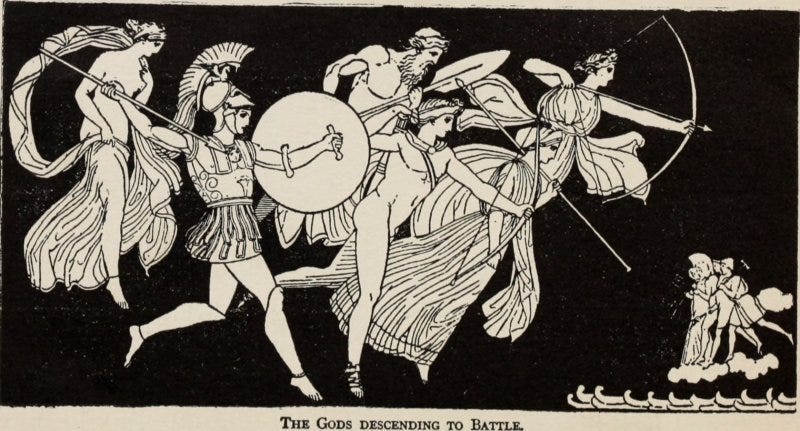Today, we pit two Iliad translations against each other—one rhymed, one unrhymed—to discover which sounds better and which does more justice to its subject. The rhymed version is from 1720 and by Alexander Pope. Classicist Daniel Mendelsohn labeled it the greatest of all time in a similar comparison. The unrhymed is by Peter Green, who came out on top in an even more extensive comparison. That one’s by an anonymous writer, but one who clearly knows their Greek.
Both are considered faithful to the source and excellent reads. So this taste test is as fair as I can make it.
Pope:
Achilles’ wrath, to Greece the direful spring
Of woes unnumber’d, heavenly goddess, sing!
That wrath which hurl’d to Pluto’s gloomy reign
The souls of mighty chiefs untimely slain;
Whose limbs unburied on the naked shore,
Devouring dogs and hungry vultures tore.
Since great Achilles and Atrides strove,
Such was the sovereign doom, and such the will of Jove!
Green:
Wrath, goddess, sing of Achilles Peleus’s son’s
calamitous wrath, which hit the Achaians with countless ills—
many the valiant souls it saw off down to Hades,
souls of heroes, their selves left as carrion for dogs
and all birds of prey, and the plan of Zeus was fulfilled—
from the first moment those two men parted in fury,
Atreus’s son, king of men, and the godlike Achilles.
Pope:
Declare, O Muse! in what ill-fated hour
Sprung the fierce strife, from what offended power
Latona’s son a dire contagion spread,
And heap’d the camp with mountains of the dead;
The king of men his reverent priest defied,
And for the king’s offence the people died.
For Chryses sought with costly gifts to gain
His captive daughter from the victor’s chain.
Suppliant the venerable father stands;
Apollo’s awful ensigns grace his hands:
By these he begs; and lowly bending down,
Extends the sceptre and the laurel crown.
He sued to all, but chief implored for grace
The brother-kings, of Atreus’ royal race.
Green:
Which of the gods was it brought them into contention?
Leto’s and Zeus’s son: for he, enraged by the king,
spread a foul plague through the army, and men were dying,
all because Chryses his priest had been dishonored
by Atreus’s son. Chryses came to the Achaians’ swift ships
to win his daughter’s release, bringing ransom past counting,
in his hands the laurel wreaths of the deadly archer Apollo
on a golden staff, and made his plea to all the Achaians,
but first to the two sons of Atreus, the host’s field marshals:
Pope:
“Ye kings and warriors! may your vows be crown’d,
And Troy’s proud walls lie level with the ground.
May Jove restore you when your toils are o’er
Safe to the pleasures of your native shore.
But, oh! relieve a wretched parent’s pain,
And give Chryseïs to these arms again;
If mercy fail, yet let my presents move,
And dread avenging Phœbus, son of Jove.”
Green:
“Atreus’s sons, and you other well-greaved Achaeans,
may the gods who have their homes on Olympos grant you
to sack Priam’s city and win a safe homecoming!
But release my dear daughter, accept the ransom I offer,
show respect for Zeus’s son, Apollo, the deadly archer.”
Green’s version feels more contemporary. And when translating the classics, bringing them into our present is often a high priority. But Pope’s version has an old-school charm that feels right when placed near other classics.
Twenty-first century culture does suggest another approach to rhyming adaptations. But I’ll get back to that in a couple of days.
P.S.: Today be Talk Like a Pirate Day!




Dear T:
Ah! Sharing a mutual love for Homer. I am no Greek scholar, but one of my great joys of my
long teaching career was to introduce The Iliad to students. What a profound and moving
poem it is. I, of course, relied on very modern translations. The battle scenes in the Brat Pitt film were quite useful, especially when some studenhts caught on to the fact that in the movie soldiers died unnamed. Homer does not allow Greeks & Trojans to die anonymously.
And, Achilles shield in Book 18 foresaw technicolor talking pictures.
Your recent post touched a nerve.
Louis